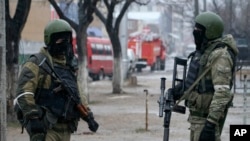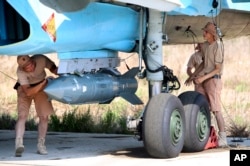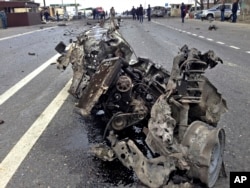Islamic State's claim of responsibility for an attack on Russian police in the Moscow region last week raises concerns about the terrorist group's possible plans for targeting the Russian capital.
Russian authorities say the two men involved, armed with a gun and two axes, were killed after clashes with police at a traffic post outside the city.
Islamic State, via the Amaq news agency, said the attack was revenge for Moscow's yearlong bombing campaign in Syria.
"Russia as a target is growing in value as Russia is more deeply involved, and actively involved, in supporting the [Bashar al-] Assad regime, supporting the Iranians in the field there," said Moscow-based defense analyst Pavel Felgenhauer.
Russian authorities are playing down the attack's significance and the IS claim.
TASS, the official Russian news agency, quoted a law enforcement official as saying links with extremists were being investigated, but no such links had been found.
Russian investigators are focusing on two possible explanations for the violent attack, reported TASS: It could have been either an attempt to take the policemen's weapons or an act of revenge because of conflict with the policemen.
Moving toward Moscow?
Acknowledging an IS attack would mean accepting that Moscow is vulnerable, according to Felgenhauer.
"If and when they will be ready, I don't know. But I'm sure they're working on mega terrorist attacks … and to try and do it in Moscow — not the Russian provinces, not the North Caucasus," Felgenhauer said. "A major terrorist attack in Moscow is going to cause the most possible political splash compared with any attack in any other part of Russia."
IS and affiliated groups have claimed attacks on Russia in the past, including the bombing of a passenger plane from Egypt last year that killed more than 200 Russian tourists. Russian media reported at least two fatal bombing attacks on police in Dagestan this year claimed by IS-affiliated groups. But this was the first IS-claimed attack near Moscow.
"While the attack was hardly especially significant or successful, the very fact that IS is beginning to have traction with discontented Muslims in Russia is a dangerous sign," said Mark Galeotti, senior research fellow at the Institute of International Relations in Prague. "In some ways, IS tends to spread virally, so once some are affected, others are more likely to follow."
Russian IS fighters
Russian officials say hundreds of Russian citizens have left the country to fight with Islamic extremist groups in Syria, including IS. Reports that Russian officials helped radicals leave the country to participate in foreign wars seem plausible, Felgenhauer said.
"There has been a very noticeable decrease of terrorist attacks in the North Caucasus as the bad guys moved into Syria, were fighting there, many of them killed there, and less of the radicals [are] left here in the Russian Federation," he said.
"The kind of extremist philosophies IS espouses have relatively little support amongst Russia's Muslims, outside the North Caucasus," Galeotti noted, "while the country's security apparatus remains formidable. It is inevitably a concern, but not yet at least a serious threat."
But there are concerns that Russian fighters could return from Syria with the aim of spreading the violent ideology at home.
"This is a definite worry and, to be blunt, one of the reasons why Moscow is so eager to see them killed beforehand in the battlefields of Syria," Galeotti said.
While Russian authorities claim they are attacking IS and other terrorists in Syria, they are targeting anyone in opposition to Assad.
There is no question that Russian security forces are taking the potential threat from IS seriously, Galeotti said.
"It may be that whereas al-Qaida was once these fighters' greatest inspiration, IS will replace it," he said. "There are concerns about wider radicalizations — in Tatarstan, among Central Asian migrant workers — but these are still largely no more than potential threats.
"The fighters of the North Caucasus remain the number one challenge to Moscow today," Galeotti concluded.
"If there are no attacks, no major attacks, then they are effective," Felgenhauer said, when asked how prepared Russia's security forces are to prevent further IS attacks. "If there is an attack, God forbid, then there was a lapse in security."


